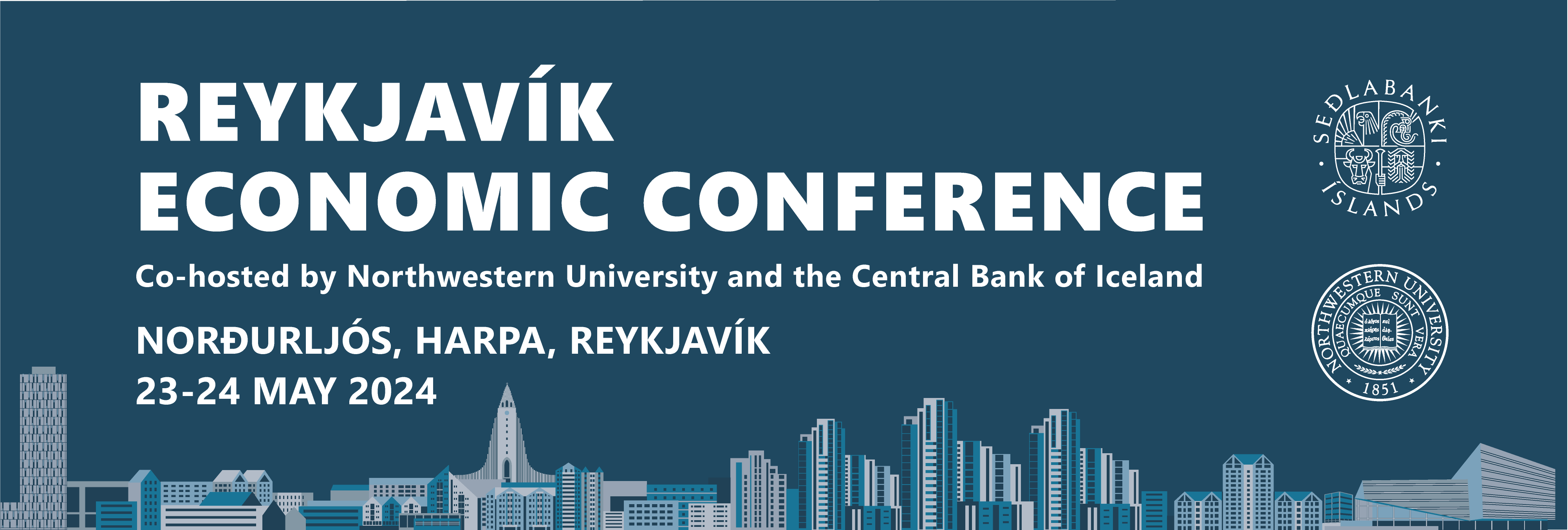Reykjavík Economic Conference
Macroeconomic stabilisation in small open economies – challenges and lessons
The Central Bank of Iceland and The Center for International Macroeconomics at Northwestern University in Chicago co-hosted a two-day conference on the expansion of central bank objectives and toolboxes in recent years with particular focus on its role in macroeconomic stabilisation in open economies.
The conference brought together distinguished academics and policymakers for contributions and discussions on the logic behind expanding central bank objectives beyond containing inflation. There were discussions on the effectiveness and consequences of macroprudential policies, on international capital flows and the case for intervening in the currency markets, and how external and public deficits and sustainability concerns affect markets and expectations.
The conference was held at Harpa Concert and Conference Hall in Reykjavík on 23-24 May 2024.
Draft Programme
Conference moderator: María Sigrún Hilmarsdóttir
08:00–08:30 Registration and coffee
08:30-09:00 Opening speech
Governor Ásgeir Jónsson, Central Bank of Iceland
09:00-09:30 New Perspectives on Quantitative Easing and Central Bank Capital Policies
Keynote address by Tobias Adrian, Financial Counsellor and Director of the Monetary and Capital Markets Department of the International Monetary Fund
Q&A
This event is live streamed
09:30-10:15 It’s Baaack: The Surge in Inflation in the 2020s and the Return of the Non-Linear Philips Curve
Paper by: Pierpaolo Benigno and Gauti Eggertsson
10:15-10:45 Coffee break
10:45-11:30 Exchange Rates and Monetary Policy with Heterogenous Agents: Sizing up the Real Income Channel
Paper by Ludwig Straub
Discussant: Benjamin Johannsen
11:30-12:35 Panel discussion: The promise of macro-pru
Chair: Martin Eichenbaum, Northwestern University
Huw Pill, Chief Economist, Bank of England
Governor Ahmet Ismaili, Central Bank of the Republic of Kosovo
Ásgerður Ósk Pétursdóttir, Bath University
12:35-13:35 Lunch
13:35-14:20 Banking on Uninsured Depostis
Paper by: Itamar Drechsler, Alexi Savov, Philipp Schnabl, Oliver Wang
Discussant: Martin Eichenbaum, Northwestern University
14:20-15:05 The Macroeconomic Consequences of Exchange Rate Depreciations
Paper by Masao Fukui, Emi Nakamura and Jón Steinsson
15:05-15:30 Coffee
15:30-17:00 Panel discussion: Currency market interventions
Chair: Jón Steinsson, University of California, Berkeley
Már Guðmundsson, former Governor, Central Bank of Iceland
Governor Martin Galstyan, Central Bank of the Republic of Armenia
Shalva Mkhatrishvili, Head of the Macroeconomics and Statistics Department, National Bank of Georgia
08:45-09:15 Coffee
09:15-10:30 Panel discussion: Stabilisation in small open economies: With or without independent monetary policy
Chair: Harris Dellas, University of Surrey and the Karl Brunner Institute
Governor Madis Müller, Bank of Estonia
Governor Anita Angelovska-Bezhoska, National Bank of the Republic of North Macedonia
Governor Bostjan Vasle, Bank of Slovenia
10:30-10:50 Coffee
10:50-11:35 The Macroeconomics of Trade Credit
Paper by: Luigi Bocola and Gideon Bornstein
Discussant: Chris Clayton
11:35-12:20 The international monetary transmission mechanism
12:20-13:20 Lunch
13:20-14:00 Title: R*
Keynote address by Christopher J. Waller, Board of Governors of the Federal Reserve System
14:00-14:45 Can Deficits Finance Themselves?
14:45-15:10 Coffee
15:10-16:15 Panel discussion: Fiscal sustainability and the current account
Chair: Sergio Rebelo, Northwestern University
Francesco Bianchi, Johns Hopkins University
Governor Mário Centeno, Banco de Portugal
Herdís Steingrímsdóttir, Copenhagen Business School
16:15-17:15 Closing Reception
Information on speakers and panelists.
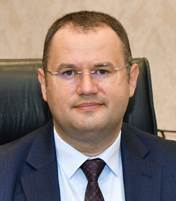
Ahmet Ismaili
Governor Ahmet Ismaili earned his doctoral degree in Economic Sciences from the University of Prishtina's Faculty of Economics. He has spent nearly two decades in pivotal roles within the banking, finance, and insurance sectors, holding positions such as CEO and member of Supervisory Boards in various local and international financial institutions. Ismaili notably served a complete five-year term as the General Director of the State Treasury within the Ministry of Finance of the Republic of Kosovo. Additionally, he has lectured at the Faculty of Economics and has been a certified senior local trainer and expert for programs conducted by both local and international organizations. In August 2023, Ismaili was appointed Governor of the Central Bank of the Republic of Kosovo. In this role, he also chairs the Executive Board of the Central Bank, the Management Board of the Deposit Insurance Fund, and represents the Republic of Kosovo as Governor on the Board of Governors of the International Monetary Fund (IMF). He lives in Prishtina with his family.
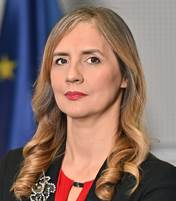
Anita Angelovska Bezhoska
Anita Angelovska Bezhoska is the Governor of the National Bank of the Republic of North Macedonia. She assumed office of Governor in May 2018, after almost twelve years of work experience in the institution, first as a chief economist, and for nearly eight years as the Vice-Governor in charge of the monetary policy, research and statistics. She is also a Governor for the Republic of North Macedonia on the Board of Governors of the International Monetary Fund (IMF) and a member of the Steering Committee of the Vienna Initiative 2, as a representative of the six Western Balkan countries. By the end of 2019, she was also a member of the Irving Fisher Committee on Central Bank Statistics at the Bank for International Settlements in Basel. Previously, Angelovska Bezhoska worked at the IMF in Washington D.C., USA, as a member of the IMF negotiation missions with member states, and providing technical assistance. She started her career in the Ministry of Finance. She led a project for establishing a treasury system, and upon its establishment, she became the first state treasurer and subsequently, a state secretary. As a state secretary in the Ministry of Finance, she coordinated processes related to the European integration, budget reforms, treasury reforms and negotiations with international financial institutions. She headed the project for development of debt management and issuance of the first government securities on domestic markets. Her contribution to the development of public finance was widely acknowledged, for which she received an award from the US Embassy in Skopje in 2004. In 2015, Angelovska Bezhoska received her doctorate in economics from the Faculty of Economics in Ljubljana, Republic of Slovenia. She graduated and completed postgraduate studies at the Faculty of Economics in Skopje where she received an award as one of the three best students. She has completed a number of specializations in the United States and Europe. She has authored many expert and research papers. During her career, she has been engaged as a lecturer by many domestic and international educational and scientific institutions. In 2022, Governor Angelovska Bezhoska received a special award for excellence in the governance of monetary policy during the COVID-19 crisis from Marili Business Forum, as a platform for female leadership in dealing with challenges in different areas.
.jpg?proc=400x400)
Ásgeir Jónsson
Ásgeir Jónsson became Governor of the Central Bank of Iceland in August 2019. He previously held the position of Head of Faculty of Economics at the University of Iceland and has extensive experience in the public and the financial sector.
Born in 1970, Governor Jónsson holds an undergraduate degree in Economics from the University of Iceland, and a PhD in Economics from Indiana University with main emphasis on monetary policy in open economies, international finance and economic history.
Governor Jónsson has written a number of scholarly papers and books on monetary policy, economic history and economic affairs. He has also written numerous articles for public consumption as well as policy reports. He as worked as an advisor in the public and private sector and steered a number of key policy committees.
Furthermore, he has published two scholarly books abroad on the Icelandic banking crisis of 2008; of its causes, the onfall and the post-crisis reconstruction of the financial sector.

Ásgerður Pétursdóttir
Asgerdur is an assistant professor in the Department of Economics at the University of Bath and an external member on the Monetary Policy Committee of the Central Bank of Iceland. She received her PhD in Economics from the University of New South Wales (UNSW Australia). Asgerdur’s research focuses on topics in monetary economics such as money, credit, liquidity, monetary policy, and central bank digital currency.
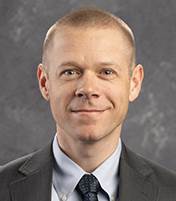
Benjamin Johannsen
Benjamin Johannsen is an Assistant Director in the Division of Monetary Affairs at the Federal Reserve Board. His academic research is focused on monetary economics, macroeconomics, and time series econometrics. He holds a Ph.D. in Economics from Northwestern University.
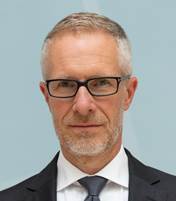
Boštjan Vasle
Boštjan Vasle was appointed Governor of Banka Slovenije in December 2018, thereby also becoming a member of the Governing Council of the ECB.
He graduated from the Faculty of Economics at the University of Ljubljana, and continued his education at the Central European University in Budapest, where he earned a Master’s Degree on monetary policy in 1997.
After completing his studies he joined Ministry of Finance of the Republic of Slovenia (RS), where he worked on monitoring and analysing RS’s public debt. In 2000 he moved to the Institute of Macroeconomic Analysis and Development (IMAD), where he was primarily involved in monitoring price formation policy and monetary policy, before becoming Head of the Macroeconomic Analysis and Economic Policy Section.
He was appointed as a director of IMAD in December 2007, and led it until the end of 2018. During his term of office he worked with domestic and international institutions in addressing all the key economic challenges facing RS, and in undertaking numerous projects in the area of national development policy.

Chris Clayton
Christopher Clayton is an Assistant Professor of Finance at Yale School of Management and a Faculty Research Fellow at the National Bureau of Economic Research. He does research in international finance and macroeconomics, finance, and macroeconomics. His research topics include geoeconomics and geopolitics, reserve currency internationalization, multinational banking, financial regulation, and monetary policy. He received a PhD in Economics from Harvard University in 2020

Christian Wolf
Christian Wolf is an Assistant Professor in the MIT Department of Economics, and a Faculty Research Fellow at the National Bureau of Economic Research. His research interests include macroeconomics, monetary economics, and time series econometrics.
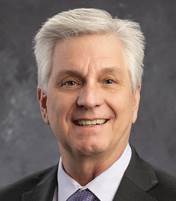
Christopher J. Waller
Christopher J. Waller took office as a member of the Board of Governors of the Federal Reserve System on December 18, 2020, to fill an unexpired term ending January 31, 2030.
Prior to his appointment at the Board, Dr. Waller served as executive vice president and director of research at the Federal Reserve Bank of St. Louis since 2009.
In addition to his experience in the Federal Reserve System, Dr. Waller served as a professor and the Gilbert F. Schaefer Chair of Economics at the University of Notre Dame. He was also a research fellow with Notre Dame's Kellogg Institute for International Studies. From 1998 to 2003, Dr. Waller was a professor and the Carol Martin Gatton Chair of Macroeconomics and Monetary Economics at the University of Kentucky. During that time, he was also a research fellow at the Center for European Integration Studies at the University of Bonn. From 1992 to 1994, he served as the director of graduate studies at Indiana University's Department of Economics, where he also served as associate professor and an assistant professor.
Dr. Waller received a BS in economics from Bemidji State University and an MA and PhD from Washington State University.
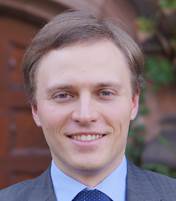
Dmitry Mukhin
Dmitry Mukhin is an Assistant Professor of Economics at the London School of Economics (LSE). He is also a research affiliate of the Center for Economic Policy Research (CEPR) and an associate at the Centre for Macroeconomics (CFM). Prior to joining the LSE, he worked as an assistant professor at the University of Wisconsin-Madison. He received his B.A. from Moscow State University, M.S. from New Economic School, Ph.D. in Economics from Princeton University, and spent a year as a postdoctoral associate at Yale University. His research focuses on the exchange rates, international monetary system, optimal monetary and fiscal policy in open economies.

Francesco Bianchi
Francesco Bianchi is the Louis J. Maccini Professor of Economics and Department Chair at Johns Hopkins University. He is a co-editor of the American Economic Journal: Macroeconomics and a member of the Center for Economic and Policy Research and the National Bureau of Economic Research. Professor Bianchi received his Ph.D. in Economics from Princeton University in 2009. Before joining Johns Hopkins, he was a professor at Duke University. He has held visiting or teaching positions at UCLA, NYU, University of Pennsylvania, Columbia University, and Northwestern University. In 2015 he was awarded the Wim Duisenberg Research fellowship and in 2010 he received the Zellner Thesis Award in Business and Economic Statistics. He has published in the American Economic Review, the Review of Economic Studies, the Quarterly Journal of Economics, and other leading academic journals. He has served as associate editor of the Journal of Monetary Economics, Quantitative Economics, the European Economic Review, and the Journal of Applied Econometrics. He has been invited to discuss his research at the 2022 Jackson Hole Economic Symposium, the 2021 G20 FWG meeting, and at numerous policy and academic institutions. Currently, Professor Bianchi’s main research interests involve the use of machine learning techniques to improve forecasts, the role of agents’ beliefs in explaining macroeconomic dynamics, the interaction between monetary and fiscal policy, and the effects of political agendas and monetary policy on asset prices.

Gauti B. Eggertsson
Gauti B. Eggertsson is a macroeconomist and a Professor of Economics at Brown University Economics Department. He received his Ph.D. in Economics from Princeton University in 2004, after having completed his B.S. in economics from the University of Iceland. He has worked at Research Departments of the International Monetary Fund and the Federal Reserve Bank of New York. Since graduation he has also been visiting faculty at Princeton, Yale, and Columbia where he taught international finance and macroeconomics at both graduate and undergraduate level. Eggertsson has published in a variety of professional journals such as the American Economic Review, American Economic Journal: Macroeconomics, American Economic Review: Insights, Brookings Papers on Economics Activity, Economic Journal, Journal of Monetary Economics, Journal of Money, Credit and Banking, Review of Economic Studies, Review of Economic Dynamics and the Quarterly Journal of Economics. The main focus of his work is the analysis of monetary and fiscal policy over the business cycle, both from a modern and historical perspective.

Gideon Bornstein
Gideon Bornstein is an Assistant Professor in the Finance Department of the Wharton School. His primary research area is macroeconomics with heterogeneity. Prior to joining Wharton, he was a post-doctoral fellow at Princeton University. He received my PhD in Economics from Northwestern University.

Harris Dellas
Harris Dellas is the director of the Karl Brunner Institute of Macroeconomic Policy, the manager of the SNB and its Watchers, a professor at the School of Economics of the University of Surrey and a research fellow at the Federal Reserve Bank of St Louis. He holds a Ph.D from the University of Rochester. He has been a consultant to international organizations and central banks (including the IMF, the Bank of Greece, the Bank of Finland, the Bank of France, the ECB, the Hong Kong Monetary Authority,..). His expertise lies in the areas of Monetary Economics, International Money and Finance and Macroeconomics. His scientific work has appeared in journals, such as Econometrica, the American Economic Review, the Journal of Political Economy and the Journal of Monetary Economics and while his policy commentary in various media.

Herdís Steingrímsdóttir
Herdis is an Associate Professor in Economics at Copenhagen Business School. She earned her PhD in Economics from Columbia University and holds an MSc in Econometrics and Mathematical Economics from the London School of Economics. Her research focuses on labor economics and household economics. Since 2022, Herdis has been a member of the Monetary Policy Committee for the Central Bank of Iceland.
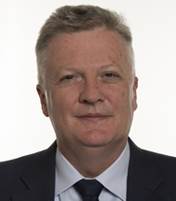
Huw Pill
Huw Pill is the Chief Economist and Executive Director for Monetary Analysis and Research at Bank of England. He is a member of the Monetary Policy Committee. Huw is responsible for the analysis the Bank uses to make it's monetary policy decisions. He also leads the research that supports all it's other functions.
Previously, Huw was Chief European Economist at Goldman Sachs (2011-18). Before that, he worked at the European Central Bank in Frankfurt. He served as its Deputy Director of Research (2009-11) and Head of its Monetary Policy Stance Division (2004-09). And he worked in its Strategic Policy Issues Unit (1998-2001). Huw was also a member of the faculty at Harvard Business School (1995-98, 2001-04, 2019-21). At the start of his career, he worked as an economist in the Bank of England’s then Economics Division (1990-92).
Huw has a BA (Hons) from the University of Oxford and an MA and PhD from Stanford University.
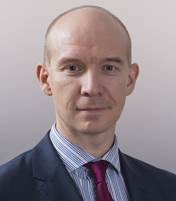
Madis Müller
Madis Müller is the Governor for Eesti Pank and a member of the European Central Bank’s Governing Council. Prior to his appointment in June 2019, Mr. Müller held the position of a Deputy Governor of Eesti Pank.
Before joining Eesti Pank in 2011, Mr Müller worked in the area of investment management at the International Finance Corporation (IFC) in Washington, DC. He has also held the roles of an advisor and senior advisor to the executive director of the Nordic-Baltic constituency at the World Bank, an economic advisor to the Prime Minister and the Minister of Finance of Estonia and that of a corporate finance consultant for PricewaterhouseCoopers.
Mr Müller holds a Masters in Finance degree from George Washington University and a degree in banking and finance from the Estonian Business School. He is also an FRM (Financial Risk Manager) and CFA (Chartered Financial Analyst) charterholder.
.jpg?proc=400x400)
Már Guðmundsson
Már Guðmundsson was the Governor of the Central Bank of Iceland from 2009 to 2019. Before, he was the Deputy Head of the Monetary and Economic Department of the Bank for International Settlements (2004-2019) and the Chief Economist and Director of the Economics Department at the Central Bank of Iceland (1994-2004). Már has a M Phil degree in Economics from the University of Cambridge. He chaired a BIS group of governors from small and open economies during the last years of his governorship. He served during part of his time at the BIS on the Council of Management of SUERF – the European Money and Finance Forum. Már has published several articles in books and economic journals on macroeconomics, monetary policy, exchange rate regimes, financial stability, capital flows and pensions, and served on the editorial boards of economic journals in Iceland, at the BIS, and in the UK. After retiring as governor, Már Guðmundsson worked with the SEACEN Centre in Kuala Lumpur on its project on Challenges and Options in Managing Capital Flows. He also produced reports for the Icelandic government on economic aspects of COVID19, and on the macroeconomic effects and regulation of pension funds. Már co-edited with Robert Z Aliber and Gylfi Zoega the book Fault Lines After Covid-19: Global Economic Challenges and Opportunities, which was published by Palgrave last year.
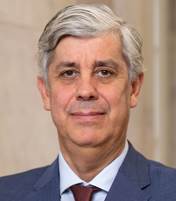
Mário Centeno
Mário Centeno is the Governor of Banco de Portugal and member of the Governing Council of the European Central Bank since July 2020. He served as President of the Eurogroup and Chair of the Board of Governors of the European Stability Mechanism, and for over four years he was Finance Minister of Portugal. An experienced economist, Mr. Centeno has held several positions in Banco de Portugal, where he started his career in 1993. He has a strong academic background with a PhD in Economics, from Harvard University, and has published several academic papers.

John Leahy
John Leahy is the Allen Sinai Professor of Macroeconomics and Public Policy in the Economics Department and the Gerald R. Ford School of Public Policy at the University of Michigan. His research has touched on a variety of topics, some of which are the traditional focus of macroeconomics such as the behavior of inflation and optimal monetary policy, and some of which are more behavioral in nature such as social learning, inattention, self-control and anticipatory utility. He is a former co-editor of the American Economic Review and the former editor of the American Economic Journal: Macroeconomics, and currently co-editor of the NBER Macroeconomics Annual. He has taught at Harvard University, Boston University, New York University, and the Indian School of Business. He has served as a consultant to the Federal Reserve System. He is a Research Associate at the National Bureau of Economic Research. He earned a BA from Williams College, an MS in Foreign Service from Georgetown University, and a PhD in Economics from Princeton University.

Jón Steinsson
Jón Steinsson joined the department of economics at Berkeley University of California in 2018 as Chancellor's Professor of Economics. He received a bachelor‘s degree in economics from Princeton University in 2000 and a Ph.D. from Harvard University in 2007. Jon taught at Columbia University from 2008 to 2018 before moving to Berkeley. He is Co-Director for the Monetary Economics program of the National Bureau of Economic Research. His main area of research is empirical macroeconomics. His work has focused on characterizing price rigidity and its macroeconomic consequences, identifying the effects of monetary and fiscal policies, and understanding the effects of forward guidance on the economy among other things. He grew up in Iceland and participates actively in the political and economic discourse in that country.

Jonathon Hazell
Jonathon an assistant professor in the Department of Economics at the London School of Economics, affiliated with the Center for Macroeconomics, the Centre for Economic Policy Research (CEPR) and the Institute of Labor Economics (IZA).
He is a macroeconomist. He serves as an associate editor at the Journal of the European Economic Association.
Jonathon received his undergraduate degree from the University of Cambridge and his PhD in economics from MIT. In 2020-2021 he was a post-doc in the Department of Economics at Princeton University, at the Julis-Rabinowitz Center for Public Policy and Finance.

Lawrence Christiano
Lawrence Christiano is the Alfred W. Chase Chair and a professor of economics at Northwestern University. He has been on the faculty at Northwestern since 1992. Before that he was employed at the Federal Reserve Bank of Minneapolis and taught at Carnegie Mellon University and the University of Chicago. He was chairman of the Northwestern Economics department, 2016-2019.
Professor Christiano is a macroeconomist who has worked on the tools of time series analysis, as well as models of closed and open economies. His models integrate financial frictions, labor market search frictions, as well as frictions allow foreign exchange rate interventions to have real effects. He has done a range of empirical work, from estimating the dynamic effects of monetary policy shocks to studying micro data on firms to understand the exchange rate impact on firm investment and employment. His work has been published in journals such as the American Economic Review, Econometrica, Journal of Economic Theory, Journal of Political Economy, Review of Economic Studies, Review of Economics and Statistics, and numerous other journals. He has also served as a research consultant for the Board of Governors of the Federal Reserve System and the Federal Reserve Banks of Atlanta, Cleveland, Chicago and Minneapolis, numerous other banks around the world, and has also been a visiting scholar at the International Monetary Fund and European Central Bank. He is the recipient of National Science Foundation grants, a Fellow of the Econometric Society, and a research associate of the National Bureau of Economic Research.

Ludwig Straub
Ludwig Straub is an Associate Professor of Economics at Harvard University. His research areas are macroeconomics and international economics. Among his topics of interest are the relationship between rising economic inequality and macroeconomic trends as well as the study of fiscal and monetary policy in heterogeneous-agent models. Ludwig received his Ph.D. in economics from MIT in 2018 and holds undergraduate and master’s degrees in mathematics and physics.

Martin Eichenbaum
Martin Eichenbaum is the Charles Moskos Professor of economics and the co- director of the Center for International Economics at Northwestern University. He is a fellow of the American Academy of Arts and Sciences, a fellow of the Econometric Society, a fellow of the Royal Society of Canada, a Research Associate of the NBER, a member of the National Academies of Sciences, Engineering, Medicine Roundtable on Macroeconomics and Climate-related Risks, and an International Fellow of the C.D. Howe Institute. In addition, he is a Director of the Bank of Montreal (BMO) as well as the Aaron Institute for Economic Policy at the Interdisciplinary Center Herzlia. He is currently the co-editor of the NBER Macro Annual. He was co-editor of the American Economic Review as well as an associate editor of the Journal of Monetary Economics, the American Economic Journal - Macro, and the Journal of Money, Credit and Banking. He is currently a consultant to the Federal Reserve Bank of San Francisco. He has served as a consultant to the Board of the Governors of the Federal Reserve System, the Federal Reserve Banks of Atlanta, Cleveland and Chicago as well as the International Monetary Fund, Hightower Associates and Goldman Sachs. He received a PhD in economics from the University of Minnesota.
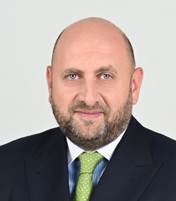
Martin Galstyan
Governor Martin Galstyan is the Governor of the Central Bank of Armenia. Before joining the Board he held numerous executive positions at the Bank, namely; Director of research and training center in Dilijan, Head of Statistics department and the Head of reserves management.
He also teaches numerous courses at the American University of Armenia. The flagship course is the “Microeconomics of Competitiveness” which is taught in affiliation with Harvard Business School. He is the first recipient of Excellence in Teaching Award at the American University of Armenia.
Martin Galstyan holds postgraduate degree from John F. Kennedy School of Government at Harvard University.

Morten Ravn
Morten O. Ravn is the Chair of Macroeconomics at University College London. His research has been concerned with a broad set of issues in macroeconomics and macroeconometrics. His most recent work has been concerned with issues such as the impact of financial intermediation on macroeconomic stability and on household insurance, with labor market frictions and aggregate fluctuations in the face of inequality, monetary-fiscal interaction, with anti-trust and market power, and dynamic causal analysis.
Morten is a Co-Editor of Quantitative Economics and Chairman of the Publications Committee of the Royal Economic Society, and is a past Managing Joint Editor of the Economic Journal. He is also a Regular Visitor at DG Research of the European Central Bank. He is a Research Fellow of the Centre for Economic Policy Research and a Fellow of the Econometric Society and of the European Economic Association. He holds a PhD from the University of Southampton and a Master's Degree in Economics from the University of Aarhus.

Philipp Schnabl
Philipp Schnabl is the Martin J. Gruber Professor in Asset Management and Professor of Finance at the New York University Stern School of Business, as well as the Sidney Homer Director of the Salomon Center for the Study of Financial Institutions. He is a Research Associate in Corporate Finance at the National Bureau of Economic Research and a Research Affiliate in Financial Economics at the Center for Economic and Policy Research. Professor Schnabl studies financial intermediation, monetary policy, and corporate finance.His work has been published in leading academic journals including the Quarterly Journal of Economics, the Review of Economic Studies, the Journal of Finance, the Journal of Financial Economics, and the Review of Financial Studies. His work received several awards including the Journal of Finance 2012 Brattle Best Paper Prize, the Journal of Finance 2018 Amundi Pioneer Distinguished Paper Prize, and the Journal of Finance 2021 Brattle Distinguished Paper Prize. Professor Schnabl earned his Ph.D. from the Economics Department at Harvard University, his M.P.A. from the Harvard Kennedy School and his B.A. and M.A. from the Vienna University of Economics and Business Administration.

Sergio Rebelo
Sergio Rebelo is the MUFG Distinguished Professor of International Finance at the Kellogg School of Management, where he has served as Chair of the Finance Department. He is the co-director of the Center for International Macroeconomics at Northwestern University.
Professor Rebelo does research on macroeconomics and international finance. He has studied the causes of business cycles, the effect of economic policy on economic growth, the sources of exchange rate fluctuations, and the economic impact of epidemics. His research has been funded by the National Science Foundation, the World Bank, the Sloan Foundation, and the Olin Foundation.
He is a fellow of the Econometric Society, the National Bureau of Economic Research, and the Center for Economic Policy Research. He has been a member of the editorial board of various academic journals, including the American Economic Review, the European Economic Review, the Journal of Monetary Economics, and the Journal of Economic Growth. He received his Ph.D. in Economics from the University of Rochester.

Shalva Mkhatrishvili
Shalva Mkhatrishvili is the Chief Economist / Head of Macro at the National Bank of Georgia, covering monetary policy analysis and implementation as well as macroeconomic research and monetary, financial and balance of payments statistics. He has been a key person in developing Forecasting and Policy Analysis System for the NBG within the inflation targeting reform. In addition, Shalva is a Technical Advisor of the International Monetary Fund, participating in IMF technical assistance missions to different country central banks, helping them conduct macroeconomic model-based policy analysis. He has also taught macro and monetary economics at various Georgian universities.
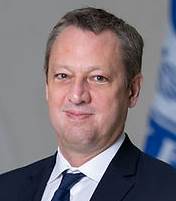
Tobias Adrian
Tobias Adrian is the Financial Counsellor and Director of the Monetary and Capital Markets Department of the International Monetary Fund (IMF). In this capacity, he leads the IMF’s work on financial sector surveillance, monetary and macroprudential policies, digital money, financial regulation, bank resolution, debt management, capital markets, and climate finance. He also oversees capacity building activities in IMF member countries with regard to the supervision and regulation of financial systems, bank resolution, central banking, monetary and exchange rate regimes, central bank digital currency, and debt management.
Prior to joining the IMF, Mr. Adrian was a Senior Vice President of the Federal Reserve Bank of New York and the Associate Director of the Research and Statistics Group. At the Federal Reserve, he contributed to monetary policy, financial stability policies, and to crisis management.
Mr. Adrian has published extensively in economics and finance journals. His research spans macro-finance, monetary policy, financial stability, and climate finance, with a focus on aggregate consequences of capital markets developments. He has taught at Princeton University and New York University. He is member of the editorial boards of the International Journal of Central Banking and the Annual Review of Financial Economics.
Mr. Adrian holds a Ph.D. from the Massachusetts Institute of Technology in Economics, an MSc from the London School of Economics in Econometrics and Mathematical Economics, a Diplom from Goethe University Frankfurt and a Maîtrise from Dauphine University Paris. He received his Abitur in Literature and Mathematics from Humboldtschule Bad Homburg.

